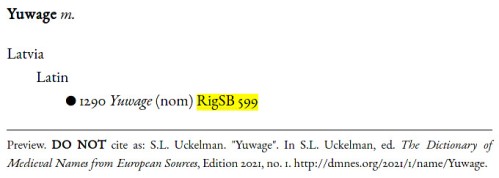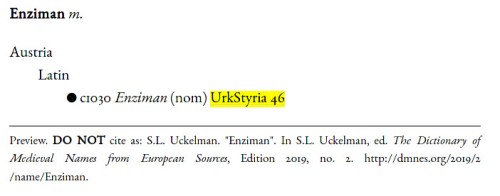Editor’s Introduction: The DMNES staff are super delighted to host a three-part guest blog by Dr. Anna Dorofeeva. Dr. Dorofeeva is a historian specialising in Western Latin book history and culture, and her current work focuses on ciphers and cryptography in medieval manuscripts; you can follow her on Twitter at @LitteraCarolina. In this series of posts, she talks about how personal names were rendered in code form in the Middle Ages.
Part 1 is here; Part 2 is here; Part 3 is below.
Secret names: Remembering rather than hiding (Part 3)
Dr. Anna Dorofeeva, ZKS Barker Junior Research Fellow, Durham University
Ultimately, these sorts of codes were made to be seen, and the names encoded within them were meant to be remembered. This was the intention of the eighth-century abbess who wrote this message by substituting the vowels with abbreviations for ordinal numbers:
Ego una Saxonica nomine Hugeburc ordinando hec scribebam
I, a Saxon nun named Hugeburc, wrote this.
This message appeared in the prologue to Hugeburc’s own work, the Hodoeporicon: a life of the Anglo-Saxon missionary saint Willebald. In it, she called herself ‘a little ignorant creature’, but both her skilled Latin and her use of code showed how untrue this was. [1] While claiming modesty, she ensured that she would be remembered for her learning.
Most ciphers seem to have been written by adults – even high-status ones, who composed their own works and were entrusted with the copying and decoration of books. But we do have one instance of a cipher used by a child, in a ninth-century manuscript of poetry probably used in an early medieval classroom. At the beginning of the book, there is a marginal note, written in a cipher in which dots were substituted for vowels. Here, however, they are also arranged roughly in the shape of the vowel itself. The note reads:
Bernardus puer me fecit.
Bernardus, a boy, made me [i.e. the note]
Many of these ciphers were written by substituting vowels, which was both common and not difficult to crack. But concealment wasn’t the point. Medieval ciphers can be compared to computer languages, encoding and recording metadata about manuscripts, and the people who made them. Ciphers were therefore meant to draw attention, to communicate their contents, and ultimately to ensure that names – and the people behind them – weren’t forgotten.
References
[1] https://thijsporck.com/2017/05/15/anglo-saxon-cryptography/.












